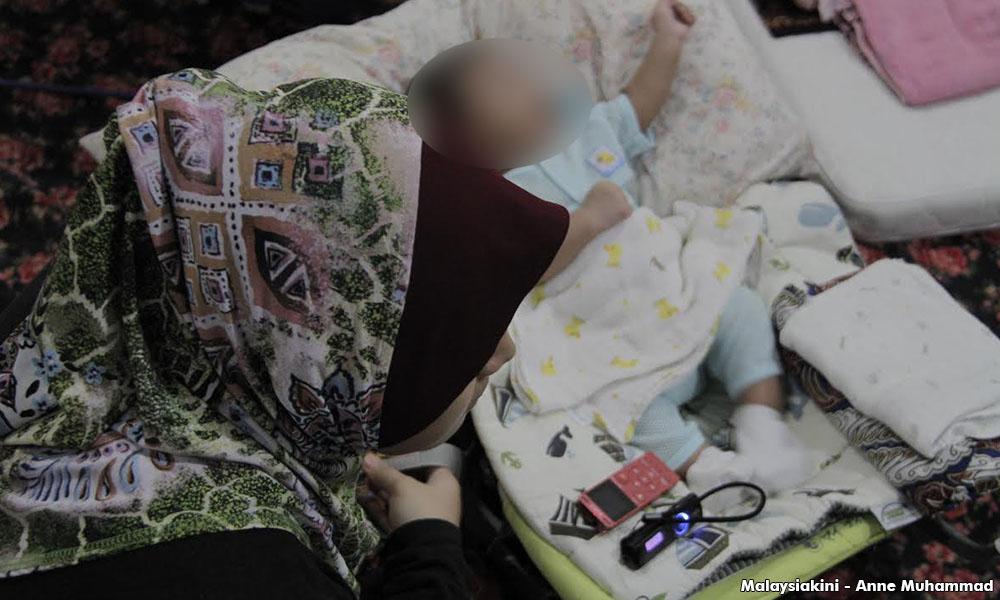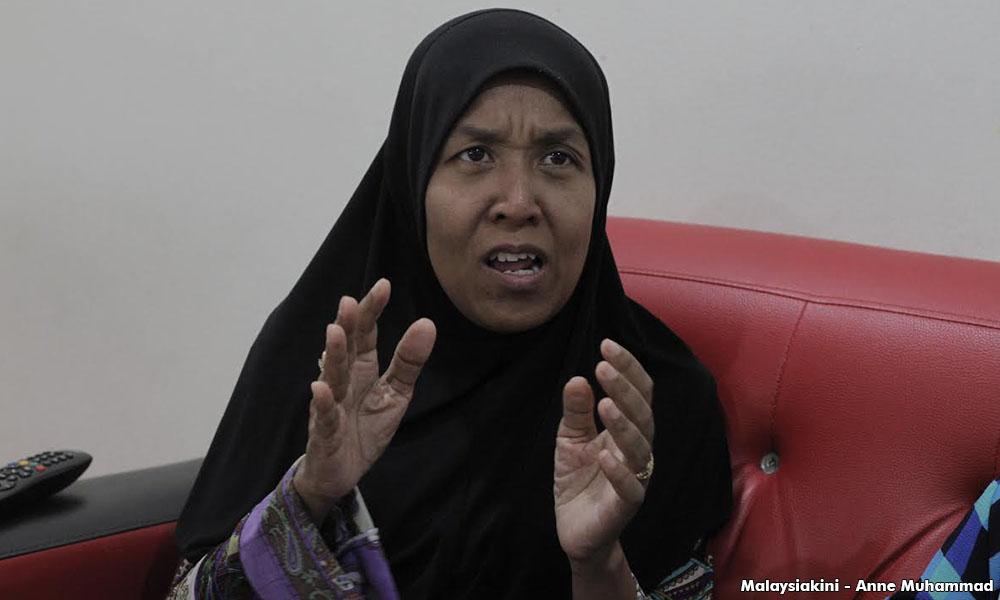SPECIAL REPORT At first glance, Siti seems like an ordinary young woman.
In her 30s, with a career in event management as well as a boyfriend of three years, no one would guess the magnitude of the secret she harbours.
Just two weeks ago, Siti was pregnant – and unmarried.
Currently in confinement after delivering her son, she chose to keep her baby, despite the pressures she would face from the Malay-Muslim society.
Her decision comes even as desperation drives many unwed mothers like her to abandon their babies in all sorts of places, often killing the infants in the process.
 According to police statistics, an average of 100 babies are dumped each year. Out of this figure, more than half are found dead.
According to police statistics, an average of 100 babies are dumped each year. Out of this figure, more than half are found dead.
And these are only those cases that have been reported. The figure could be much higher.
As a first-time mother herself, Siti said reading such news breaks her heart.
But she admitted that discovering that one is pregnant is the worst nightmare any single, Malay woman could face.
Which is why she believes it is important for women in such a situation to break the news to their family members in stages.
“If your mother is more understanding, tell your mother first.
"You have to be strong and admit that you have made a mistake.
"Once you have told your family about it, the process becomes much easier," she said.
Reaching out to family
Siti only learned of her fate when she was already five months pregnant; her period had always been irregular, so it was the constant cravings for laksa that tipped her off that something was amiss.
"Once you are in your second trimester, it is too late to do anything," she said, stressing the importance of monitoring one's menstrual cycles.
She first told her younger sister before informing her mother and ultimately her father.
"My mother was my source of strength in facing my father," said Siti, who admitted that the pregnancy was a "mistake" on her part.
She also broke the news to her boyfriend, who chose to stay by her side. But it was she who decided that they not meet for the time being.
Siti can only picture herself taking care of her newborn, her work commitments, and her family. This is despite both their families wanting the two to get married.
"I would be lying if I say I no longer love my boyfriend. But I don't think of marriage anymore," said Siti.
But she said she would reconsider if her boyfriend summoned the courage to tell his own father about their predicament.
Meanwhile, her advice to those facing the same situation as her? Don't panic.
"Get one or two people whom you really trust to advise you.
"When you sit alone, that's when your mind thinks about all kinds of things and most of the time they are unnecessary," she said.
Victim of circumstances
However, not all unwed, pregnant women can say their situation was a result of their “own mistakes”.
Farah (not her real name) is a victim of circumstances.
For years, she said, her elder brothers and a brother-in-law took turns raping her.
And now, the 18-year-old does not know which of the three is the father of her child.
Farah recalled being raped by her brothers each time she returned home from boarding school during the holidays.
“They would cover my mouth to prevent me from screaming,” she said.
Farah was so angry that she wanted to kill them. But she kept silent, knowing that no one would believe her if she spoke up.
“I didn’t tell anyone, not even my friends and teachers.
“I remember how I couldn’t answer my UPSR examinations properly and would always find excuses not to return home,” she said.
When Farah became pregnant, she wasn't even aware of it at first, as she was still getting her period.
Her eldest sister, concerned that she had been looking unhealthily pale, sent her for a health check-up, and a urine test revealed she was six months pregnant.
This eventually led to her brothers being remanded for seven days, she said, though they were later released.
“The police are looking for my brother-in-law but he has run away to Thailand," said Farah.
Although a DNA test has yet to be conducted, Farah is confident that her brother-in-law is the father of her child due to the similar facial features.
The mother of her brother-in-law even sold two pieces of land and offered the money to Farah to withdraw the case against her son.
Farah, however, declined to do so.
The teenager does not wish to continue her studies and hopes to get a job and her own place to stay.
As a young mother, Farah admits that it has not been easy.
“It has been hard. But I’m more worried for my mother. If the villagers know about this, she will be driven out from the village,” she said.
Like Siti, Farah, too, has no plans to marry.
“I want to focus on taking care of my child. I think it would be hard to get someone who will accept me and my child.
“I’m scared that in the end we will be left to fend for ourselves. So it's okay if it is just me and my child,” she said.
Her simple message to others in the same situation is to “stay strong”.
“Although it feels like it, it’s not the end of the world,” said Farah with a wry smile.
Our home away from home
Both Siti and Farah are occupants of a shelter for unwed pregnant mothers.
 The founder of Rumah Kita, Vimmi Yasmin Abd Razak (left), said the shelter acts as a transit house of sorts.
The founder of Rumah Kita, Vimmi Yasmin Abd Razak (left), said the shelter acts as a transit house of sorts.
Vimmi and a team of volunteers manage the shelter, which needs at least RM2,000 per month to operate.
With zero corporate funding, the shelter sustains itself through contributions in the form of basic necessities for babies as well as household items.
Currently it is home to seven mothers, five newborns and three toddlers. Mothers there go for religious classes and learn to cook and tidy the house.
The house, said Vimmi, is open to any pregnant mother.
“They can even come here if they are only one month into their pregnancy.
“After delivery and confinement, they can leave once they feel strong enough,” said Vimmi, adding that the shelter does not make it compulsory for occupants to remain there for a certain period of time.
'Between mother and God'
Vimmi always advises parents of unwed mothers not to be hasty in their decision to give their babies up for adoption.
“Most parents will change their minds once they see their grandchildren.
“That’s why I always advise them not to give away their babies,” she said.
Meanwhile, Vimmi believes the issue of pregnancy out of wedlock is between these mothers and God.
“That’s why you see some placing their babies in a wardrobe out of desperation,” she said, referring to a recent case involving a college student.
The student had wrapped the baby in a towel and a plastic bag before placing it in her wardrobe.
She is currently being investigated under Section 318 of the Penal Code for concealment of birth.
Vimmi hit out at Internet users who had slammed the college student, and said that they were just as culpable as she.
“They say she is stupid for placing the baby there, that she should have at least given the baby away.
“You people are the ones who made her dump the baby. Even then, she didn’t throw away the baby, she just placed it there,” she said.
Vimmi believes that everyone is at fault in this issue. It is easy to blame the parents, she said, but society at large is doing nothing to help in such situations.
Sex education is vital, she stressed, though she admitted that certain boundaries would need to be set as accepting out-of-wedlock pregnancies would not be ideal in a conservative society.
“We need to do public awareness campaigns on a large scale. It’s not merely about putting stuff on paper and about fulfilling a company’s corporate social responsibility initiatives,” she said.
As of now, Vimmi has no plans to operate a baby hatch at the shelter, due to concerns of handling a baby with HIV.
“Let us concentrate on managing mothers and their babies first,” she said.
OrphanCare Foundation launched the country’s first baby hatch in 2010. The establishment of the baby hatch in Petaling Jaya has helped to reduce fatal cases of baby dumping.
The interviews were jointly conducted by Alyaa Azhar and Anne Muhammad

